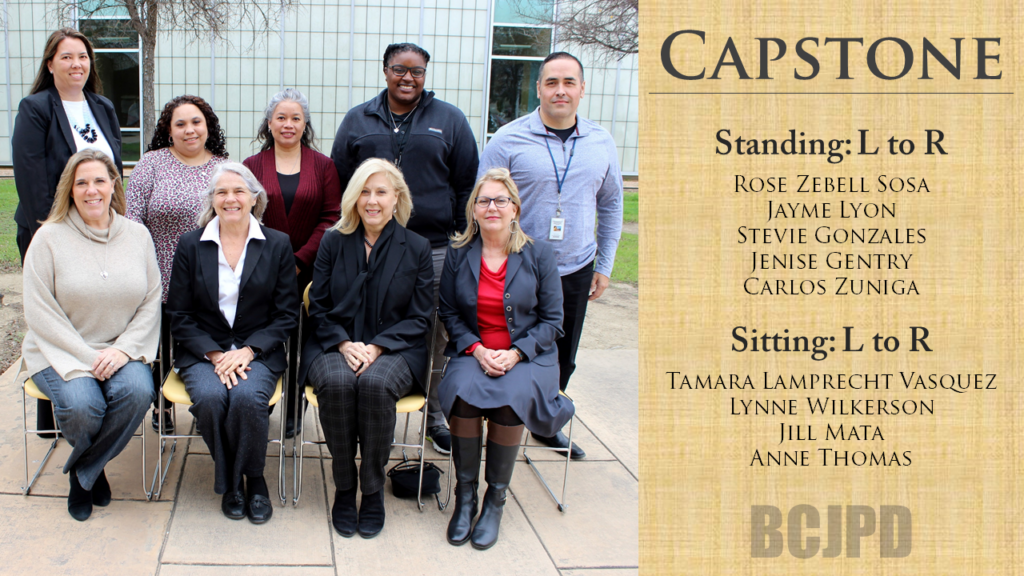2019 Capstone of the Year
Bexar County, Texas
After attending the 2017 Youth in Custody Certificate Program, the Bexar County, Texas team centered their Capstone Project on supporting youth in secure residential care to transition back into their communities. They focused their effort in a specific local facility, the Krier Center, building readiness for meaningful academic and employment opportunities for youth. In particular, the team created academic, vocational, technological, and life skills programs with support from the County Juvenile Probation Department, East Central Independent School District, County District Attorney’s Office, and other community-based partners.
Through their Capstone Project, the Bexar County team has expanded career and technical education (CTE) options for youth by developing Memoranda of Understanding with Goodwill Industries of San Antonio and Alamo Workforce Solutions. In 2018, Goodwill taught fifty-seven class sessions in ten new courses to help youth build career-related knowledge and skillsets. Through these courses with Goodwill, youth can obtain various certifications. These certifications allow youth to be job-ready when they re-enter the community. In 2019, Goodwill reduced the type and frequency of course offerings for youth at Krier. Although this was a minor setback, it allowed the Krier facility to research methods to offer these courses internally. During the last half of 2019, the CTE Specialist was able to offer the same Food Handlers, TABC, and OSHA-10 courses Goodwill offered, thus expanding their capacity to ensure every child that is eligible to work can leave the facility with those certificates. The Alamo Workforce Solutions also plays a key role in connecting youth to employment opportunities after they transition back into the community. So far, a total of 170 youth have participated in the job readiness programs, and 165 of these youth successfully completed the courses.
In addition, the CTE Specialist, a newly created position at the Krier Center, ensures each youth receives individualized educational and/or career services. For example, Bexar County Learning Center introduced a summer GED program in the 2017 – 2018 school year, and the team has also paid special attention to support youth’s credit recovery process. During the Fall 2019 school year, Krier youth earned a total of 110 credits in the classroom and credit recovery lab. The passing of House Bill 2442 further supported efforts in individualizing youth’s schedule, allowing a smoother transition between academic and therapeutic programming, as well as a better teacher-student ratio (from 1:12 to 1:8). In 2019, the team rolled out a new Dialectical Behavior Therapy program that incorporates therapeutic, education, and career components. These changes are associated with a reduction in behavioral incidents, dropping from 276 to 148 per semester. During the 2018 – 2019 school year, the Krier Center saw an even greater reduction in behavioral incidents during school, dropping from 148 to 51. The facility also reduced its use of seclusion, from 2,487 incidents in 2015 to 1,295 in 2019.
Moreover, the team has strengthened the Krier Center’s youth and family engagement efforts. For example, staff at Krier Center now work closely with school staff to plan Parent-Teacher-Facility Nights. As a result, there was a 90% increase in the number of parents who attended the event from 2017 to 2018. Since January 2019, the team has seen a further increase to 96% parent participation in Family Skills groups in addition to Parent-Teacher-Facility Nights. Working together, the team bolstered the orientation process for youth and parents, began to provide family feedback forms, and started to include families in the Krier Center’s Admission, Review and Dismissal Meetings. Youth have the opportunity to participate in the Krier Youth Council, where they can attend the Capstone leadership team meeting and actively provide feedback and insights based on their experience at the facility.
The significant reduction in frequency of behavioral incidents, increase in the number of students receiving additional credits through credit recovery, and positive youth feedback are some encouraging preliminary results. When looking at a sample of 67 juvenile residents who have completed the Krier CTE program, 19% were enrolled in a GED program, 46% were enrolled in school, 24% were employed, 51% successfully completed probation, 15% were still active on probation and in good standing, and 3% were still in placement. In the future, the team plans to expand the number of classes further, partner with local community colleges, and develop relationships with potential employers for apprenticeship opportunities, so that youth leaving the Krier Center can more successfully transition back into their communities.
In addition to the near-term improvements achieved and cited above, an important lasting impact of the program is the strengthening of the collaborative relationship between leadership at the facility, the school, prosecutors, and outside supporting agencies. The Bexar County team’s Capstone efforts have fostered an ongoing, multi-system approach to improving the system, especially with respect to educational and vocational opportunities for youth at the Krier Center.

The original Capstone team members include:
- Estefania “Stevie” Gonzales, Executive Director of Personnel and Coordinated Services, East Central Independent School District
- Jayme Lyon, Clinical Manager, Bexar County Juvenile Probation Department
- Anne Thomas, Deputy Chief Clinical Services (retired), Bexar County Juvenile Probation Department
- Tamara Vasquez, Facility Administrator, Bexar County Juvenile Probation Department
- Lynne Wilkerson, Chief Juvenile Probation Officer, Bexar County Juvenile Probation Department
- Rose Zebell, Juvenile Division Chief, Bexar County District Attorney’s Office
- Carlos Zuniga, Deputy Chief Probation Officer, Bexar County Juvenile Probation Department
